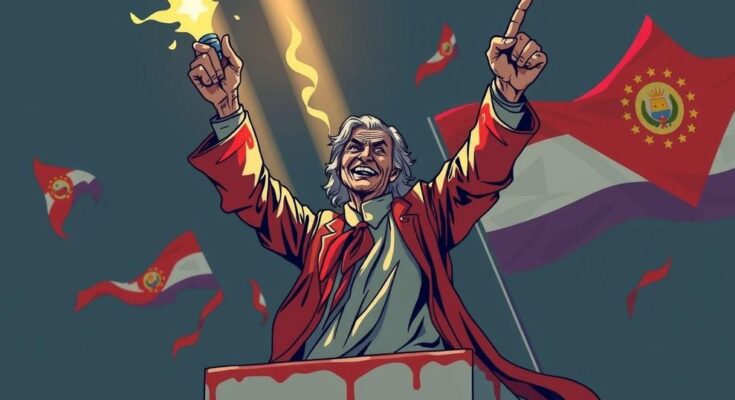Yamandu Orsi, a left-wing candidate from the Broad Front coalition, won Uruguay’s presidential election, defeating Alvaro Delgado of the National Party with 49.8% of the votes. High voter turnout and statements from both candidates highlighted a commitment to unifying the nation amidst differing sentiments. Current President Pou assured a smooth transition as Orsi steps into leadership, expected to address key economic and social challenges.
In a significant political shift, left-wing candidate Yamandu Orsi from the Broad Front coalition has emerged victorious in Uruguay’s presidential election, as confirmed by official results from the recent runoff vote. Orsi garnered 49.8% of the vote against Alvaro Delgado of the ruling center-right National Party, who received 45.9%. Voter turnout was notably high, approaching 90% in a nation of approximately 3.5 million citizens, indicating robust democratic engagement.
In his victory address, Orsi highlighted unity amidst differing political sentiments, stating, “The country of liberty, equality and fraternity has triumphed once again.” He acknowledged that those who supported his opponent, Delgado, also play a vital role in the nation’s future, saying that all should contribute to building a better Uruguay. Delgado, accepting the results graciously, remarked, “With sadness, but without guilt, we can congratulate the winner.”
Current President Luis Lacalle Pou has promised a seamless transition of power after congratulating Orsi on social media, expressing his commitment to assist in this process. Orsi, aged 57, is recognized as a prominent figure in the Broad Front, recalling the progressive legacy of former President Jose Mujica, who was revered for his simplistic lifestyle and progressive policies enhancing Uruguay’s stance on global issues.
Key issues influencing this election included prolonged economic challenges, stagnating wages, and concerns over rising violence, all pivotal in shaping voter decisions. Orsi’s anticipated administration is poised to address these critical concerns and continues the Broad Front’s objectives to prioritize social equity and sustainable policies, following a brief period of center-right governance that had altered the political landscape of the nation.
The election results follow a period of political fluctuation in Uruguay, where the Broad Front, a leftist coalition, was previously in power for 15 years before a center-right government took control in 2019. The upcoming administration led by Orsi is expected to navigate pressing issues facing the Uruguayan populace, including economic performance and public safety concerns that emerged as top priorities during the electoral process. As the son of a working-class family and a former educator, Orsi represents a shift back to leftist governance, potentially realigning Uruguay’s policies toward more progressive social and economic strategies.
The election of Yamandu Orsi marks a pivotal moment in Uruguay’s political landscape, suggesting a renewed commitment to leftist policies aimed at addressing social inequalities and economic challenges. The transition from President Lacalle Pou signals a significant ideological shift, as Orsi aims to unify a divided electorate while tackling critical issues such as economic growth and public safety. His leadership is expected to reflect the progressive ideals previously championed by the Broad Front.
Original Source: www.dw.com




